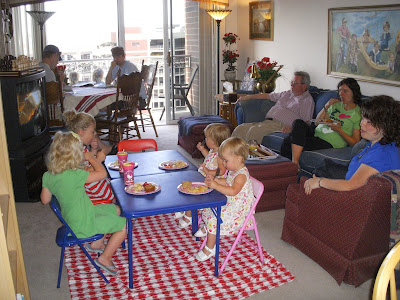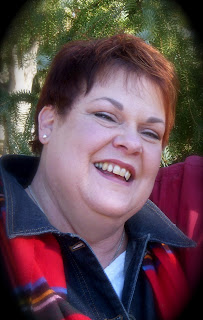 Why good health care matters to Sco
Why good health care matters to ScoI got this comment from my son-in-law and it deserves a wider audience, so I have turned it into a guest post. (You'll see why I call my in-laws
Heroes, too.)
Marty - your son-in-law Sco here.
Yes, our system needs change; there's no doubt about it. My opinion is that the problems are so huge that a large or sweeping change is required to fix everything. And as far as I understand (and I'm not the most educated on the many and various issues involved) it's impossible to come up with a solution that can be explained by a blog post, or a comment on a blog post. Every solution like "universal healthcare" and "cheaper prescriptions" sound great in the press, but there are huge negative impacts that come along with such "solutions." I don't think there's a silver bullet. "Universal healthcare" and a healthcare system more like France, Canada or Great Britain means vastly increasing taxes. It's not an easy question of who would pay for it, because someone would. It would also likely mean our most promising intellectual talent to leave the medical field and work in something that gets them more money. And it may likely mean longer wait times to get doctor appointments.
Everyone's for the option that costs themselves less money and gives them better healthcare. That solution is different for everyone's situation. And usually there are economic winners and losers in any change. It's a very divisive topic, and very difficult for any president on which to get anything significantly changed (recently Bush Jr. and Clinton).
Full disclosure: I'm employed by a small-ish company (75 employees or so). Our health insurance costs are crazy high. We pay about $340/month for the lower of 2 insurance coverage options. I'm very happy that we're able to get coverage. MY COMPANY COVERS ANOTHER $600 OR SO A MONTH FOR MY COVERAGE!!! Basically $1,000 / month for the health insurance coverage my family and I are thankful to have. Does that sound like everyone in America can have this? No way, it's just too expensive. This is why companies scale back on what they cover - their resources aren't big enough to keep up with skyrocketing costs. And our premiums go up about 10% (or more) every year. And my wife and I and our 3 daughters happen to be healthy right now (knock on wood).
And there's so much money in healthcare, that sweeping change won't happen. The only reason I say that is because opposition to a sweeping change would be ENORMOUS from those that stand to lose $$$. And with any sweeping change, there will be a lot of people who end up with less $$$. We're going to be stuck with incremental change that no one will be happy with (except for the incremental % of the population who's better off under an incremental change).
My beef with the current bills being debated in Congress is that 1) they still leave a ton of people uninsured, 2) the solution is to tax and spend. Yes, it's an incremental "solution." In my opinion, the "solution" doesn't address underlying causes, but just dumps more money into a broken system. I don't think that's going to fix anything in the long term, but it would be good to get more people covered. The next fix in 5 years will be to just dump more $$ into the same broken system (with incremental changes). Seems like a flushing toilet to me...
I would rather see some solutions that address underlying causes, such as:
1. Better healthcare results at a lower cost. The US has really sunk in recent world ratings in desired healthcare outcomes per dollar of cost. For a country that prides itself on healthcare innovation and new solutions, that fact really sucks. We should be able to be close to #1 in the world if not #1 in the world at providing the best cost-effective healthcare solutions.
We sometimes seem to seek for the latest and greatest technological healthcare solution, which also happens to be the most expensive, instead of a going with more tried-and-true methods. Drug reps and medical equipment reps influencing doctors, doctors' reimbursements from insurance companies (paid for a procedure instead of a desired result), and attitudes that you don't have to pay since your insurance will pay, all feed into this.
2. Revised compensation to doctors to more closely align doctors' compensation with what we all want - results - instead of compensating them (and thereby incentivizing them) to perform more procedures, see more patients during a day, etc...
3. Higher deductible insurance plans, so that we as consumers of healthcare will have more incentive to shop for a good solution at a good value. We'll be more price sensitive. My wife and I are now on such a plan (my company changed our insurance plan with IHC about 6 months ago in order to lower costs this last year - we didn't have a choice in the matter, really. And for the record, it's been a fine change so far.). And we have become more price sensitive and have asked doctors how much that will cost us, and when we hear an answer that's expensive, we ask for alternatives that give us a good result at a lower cost. I'm going to guess that we've incurred about $1,500 less this year (less money paid by an insurance company, hopefully translating into lower premiums in the future) just from being more price sensitive.
No, we will never be able to shop for healthcare as easily as we shop for homes or cars. We just don't have the knowledge base that doctors have. There's an information asymmetry between the provider and the consumer in healthcare, and that information imbalance will never go away. However, if we are more price sensitive, we're going to be asking our doctors more questions about different procedures that could be done for a lower cost, all in the name of getting a better result at a better cost (better value). We won't just walk in and say yes to receiving a Cadillac-costing procedure for the $30 cost of a co-pay for a visit.
4. More acceptance in the general population that doctors and medicine can't solve everyone healthcare issue in 1 hour and restore you to perfect health 100% of the time. Doctors are people and are helping you to the best of their ability 99.9% of the time, and healthcare issues can be complicated. And there are a lot of conditions that have no cures (unfortunately).
5. Less litigation, and perhaps formula driven ranges (not exact amounts) for damages related to medical mistakes (when doctors are grossly negligent).
6. Sweeping change in insurance laws, specifically in defining insurance pools. It's ridiculous that employees of huge companies have access to good insurance plans that are cheap, and just because I work at a small employer (approx 75 employees), my cost for the same type of coverage costs a lot more. How is that fair? And how is that common sense? Yes, insurance companies are pricing risk in a defined insurance pool. But the price differences are merely driven by insurance laws and how people can legally be grouped into insurance pools (if I understand the basics correctly). Why can't states designate their entire citizenship as the insurance pool, and have insurance companies write policies for that huge pool? Or give the general population access to the same insurance coverage that our Representatives and Senators receive? I'm not extremely knowledgeable about pricing health insurance, and I'm pretty sure that there would have to be some kind of pricing tiers (at least for healthcare costs that are under our control by the choices we make - smoking vs. non-smoking for example), but couldn't state laws also require pre-existing conditions to be covered?
7. This change would actually hurt me, but it makes sense (at least to me). There's a tax break that employees of companies receive that self-employed people do not get. I'm not taxed on the the approximately $600 each month that my company pays for my health insurance premium. Self-employed people basically get taxed on that $600 amount. That's not fair. Fix that tax break so that employees of a company and self-employed individuals are on a level playing field when purchasing health insurance.
Whew. Sorry for the long comment. I've tried to not rant and rave - hopefully I've come across in the manner I intended.
Anyway, those are the 7 things I want to see addressed first in healthcare reform. Some of the items I've mentioned above can't be solved by legislation, or by legislation alone. I don't think government can solve this issue by itself. And the more money that the government takes from us in taxes to "reform healthcare", the more accountability they should have and will have to the American taxpayers. But let's face it - government is an important part of the solution, but not the only part of the solution. And how much input do our opinions really have in Congress after a bill is passed? Voting incumbents out over their voting record and public pressure over their positions and actions are about the only things stopping existing bills from just getting bigger in their scope and $$ outlays.
Congressmen and women most likely (and hopefully) receive more complete information regarding the situation and what can be done to fix the situation. However, the "solutions" being produced by them are poor fixes, at least in my opinion. They're expensive stop-gaps that make for good soundbites in the media ("more universal coverage") that Congressmen and women are using to make themselves and/or their political party look better. Crappy (but classic) posturing and politics.
I'm hopefully optimistic that incremental changes will get us there over the next 15-20 years. I don't think a quick fix is practically possible. There's just too much to change, and too much money involved. Hopefully I'm wrong about that. I'm also concerned that the system will really have to break down before we see some of these needed changes. Hopefully I'm also wrong about that.
I know that I want my current healthcare coverage at a cheaper cost. And it's just not right that certain people aren't able to get affordable insurance under their current situations. What's fair about that?
We need the right kind of healthcare reform, and hopefully we'll get it. If we don't (in each of our opinions), we have the duty to voice our opinions and to also exercise our right to vote.
Sco
P.S. Here's an interesting read:
http://www.commonwealthfund.org/Content/Publications/Fund-Reports/2007/May/Mirror--Mirror-on-the-Wall--An-International-Update-on-the-Comparative-Performance-of-American-Healt.aspxThe following is Wikipedia, so realize it's limitations, but it's a decent summary:
http://en.wikipedia.org/wiki/Healthcare Thanks Sco! Are we getting informed, or what?
 First, be green parents!
First, be green parents! A Bumkins Diaper
A Bumkins Diaper (No droopy drawers nowadays.)
(No droopy drawers nowadays.) Modern Bun Warmers
Modern Bun Warmers (No droopy drawers nowadays.)
(No droopy drawers nowadays.) Modern Bun Warmers
Modern Bun Warmers










































